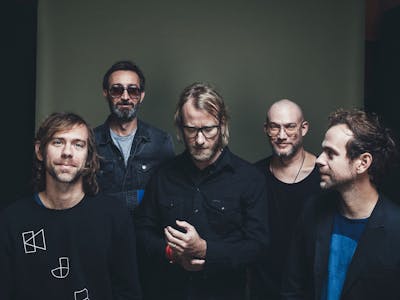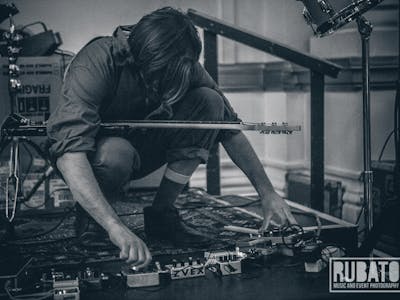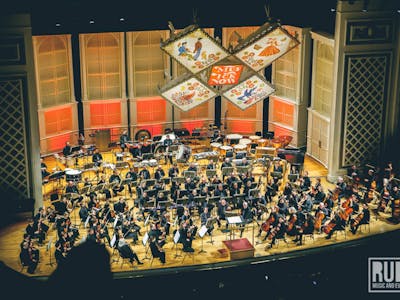Let’s cut right to the chase: Brooklyn ensemble Sō Percussion owned Saturday’s MusicNOW program. Everything else was stupendous, but this was their night. Check out photos from the performances here. A decent-sized crowd arrived for their pre-concert performance of Bryce Dessner’s “Music for Wood and Strings,” performed on four custom-built chordsticks, effectively primitive electric hammer dulcimers. The amplifiers are spread out across the stage, pelting the audience from all directions. The ensemble used bows and unsharpened pencils to strike the strings, playing in syncopated polyrhythms that would weave together and then scatter again. The repetitive work of Philip Glass immediately comes to mind, but the dulcimer arrangement lent the piece an Appalachian tinge which has become a Dessner signature. This was an astonishing, jarring performance which left some of those around me near tears.
Brooklyn composer Timo Andres was already part way into his Corbett Tower piano recital by the time people started pouring in from downstairs. He performed Schubert’s Impromptu in F Minor and Glass’s jazzy Etude No. 14 before closing with his own “Heavy Sleep,” a slow, complex work which was recorded earlier this year by pianist Bruce Levingston.
For the second night in a row, the printed program was shuffled a bit for logistical purposes. Sō Percussion returned to the stage for “man-made,” a work written specifically for them by David Lang. The quartet began at the very front of the stage, rhythmically snapping actual tree twigs before they were joined by a xylophone. When the twigs were exhausted, they moved to four sets of water-filled wine bottles tuned to a seven note scale, then a set of carefully-cut lengths of metal pipe, and finally the four settled at a xylophone, steel drum, marimba, and full drumset. With the orchestra’s backing, the piece lurches forward dangerously without ever fully taking off, building extreme tension over its 20 minute duration.
During the stage transition, Reykjavik composer Daníel Bjarnason came out to introduce his world premiere piece “Collider,” which was inspired in part by the Large Hadron Collider, the European research facility under the Swiss-French border. Bjarnason mentioned he’s particularly taken by the collider, the world’s largest machine, because “it only exists because of our curiosity to understand more about the world.” Scored for an unusually large orchestra of 96, the work opened with a deep, foreboding drone which resolved with a wash of icy strings. Themes would fall apart and then reanimate later in the work. Like the Lang piece before it, “Collider” ends on a precipice.
At the intermission, many in the crowd surged into the lobby to catch the mysterious Lanzendorf, which proved to be National rhythm section Bryan and Scott Devendorf and sideman Ben Lanz. The trio were decked out in matching olive green jumpsuits and performed churning krautrock, with Bryan playing on a stripped-down kit and an old analog sampler. Lanz, on guitar, coaxed a spectrum of tones out of his enormous pedalboard while Scott laid down a thundering foundation.
Once again, it was indie rock royalty that attracted many to Music Hall. Sufjan Stevens was on hand to perform a suite of songs from Planetarium, the song cycle composed with Nico Muhly and Bryce Dessner. Stevens arrived onstage wearing a Hustler t-shirt, a delightfully twisted nod to the festival’s setting, and an amusing contrast to Muhly’s long coattails. The five songs played on Saturday were utterly transformed from the nascent versions for string quartet and trombone septet premiered at MusicNOW 2012. “Neptune” was an instrumental string overture the first time around, but here was a piano-led opener with Stevens reaching to the upper ends of his register. Many of the cycle’s electronic experimentation was traded for symphonic flourish, but Muhly’s chiming celeste and Dessner’s intricate guitar playing still starred, dancing in beautiful counterpoint on “The Moon.” Sufjan did use his voice modulator on the intense “Saturn,” and the orchestra almost stifled the soloists on its monstrous climax. They finished with the impossibly beautiful “Mercury,” with a melody that could easily cozy up in the middle of Illinois.
Dessner and conductor Louis Langrée emerged one last time to introduce the final piece, Edgard Varèse’s sprawling masterwork “Amériques.” The composition was originally premiered in Philadelphia by the former Cincinnati music director Leopold Stokowski, and was Varèse’s attempt as a recent immigrant to pinpoint what America sounds like. It had a mixed reception at the time, audience members shouted and protested--as Langrée put it, the “music is provoking, not seducing.” The arrangement dwarfed even the Bjarnason from earlier in the evening--the Symphony was a full 120 strong, including thirteen percussionists. It’s a violent, episodic work, peppered with beautiful brass and woodwind interludes between fevered pinnacles. If this is the Frenchman’s vision of America’s sonic profile, we should truly be concerned. A curious siren pipes up underneath amid military snare marches, finally unleashing its full banshee shriek as it nears the frightening, steely finish. A breathless, sweaty Langrée turned around to a well-deserved standing ovation from the near-capacity audience. It was an astounding close to the festival’s second year collaborating with the Symphony, and only makes the 12 month wait for the next round all the more difficult.
Sunday is the final evening of MusicNOW 2015, and it moves next door to Memorial Hall. The Lone Bellow headlines, with sets by Perfume Genius and Mina Tindle starting at 7 PM.
Sō Percussion
Music for Wood and Strings (Bryce Desnner)Timo Andres
Impromptu in F Minor (Franz Schubert)
Etude No. 14 (Philip Glass)
Heavy Sleep (Timo Andres)Cincinnati Symphony Orchestra
man made (David Lang)
Collider (Daníel Bjarnason, world premiere)
Planetarium Suite (Neptune, Pluto, The Moon, Saturn, Mercury) (Sufjan Stevens, Nico Muhly, Bryce Dessner)
Amériques (Edgard Varèse)
MusicNOW Night Four: CSO, Sufjan Stevens, Sō Percussion & More
Rubato Photo




